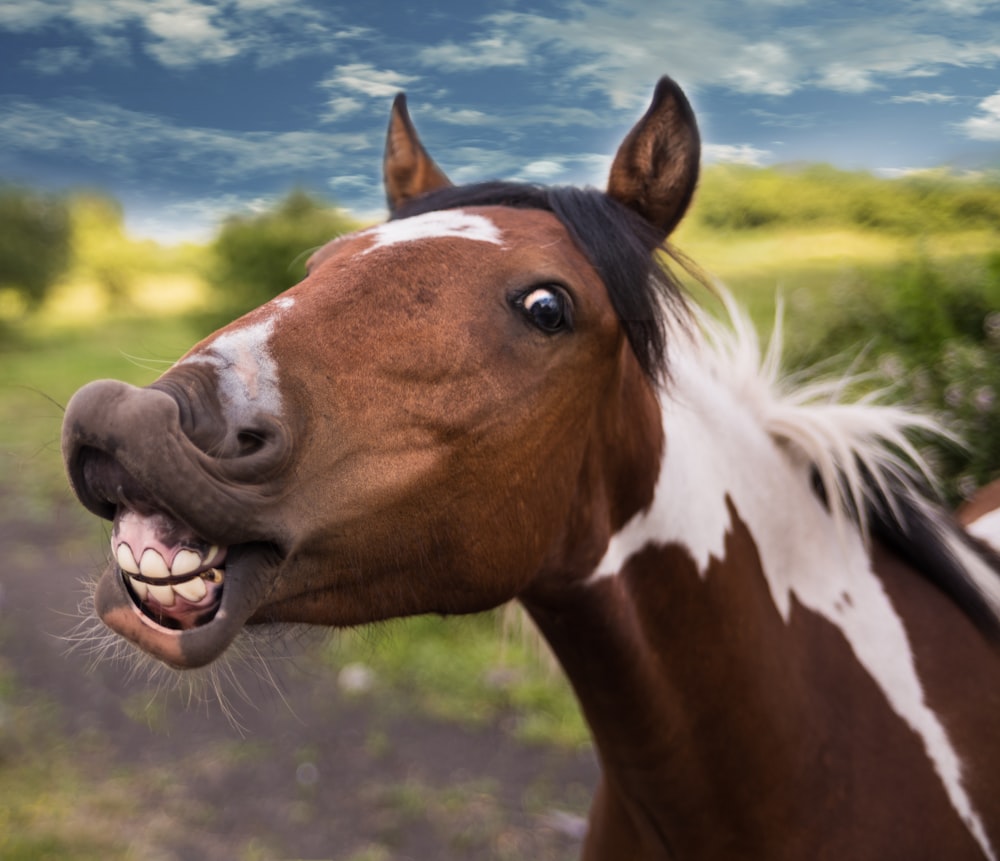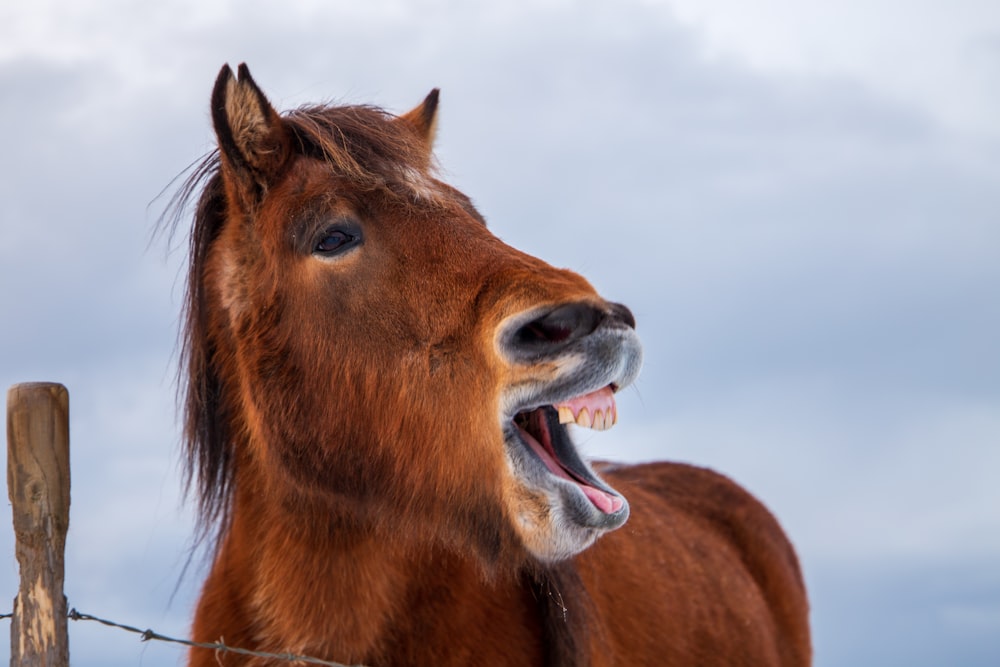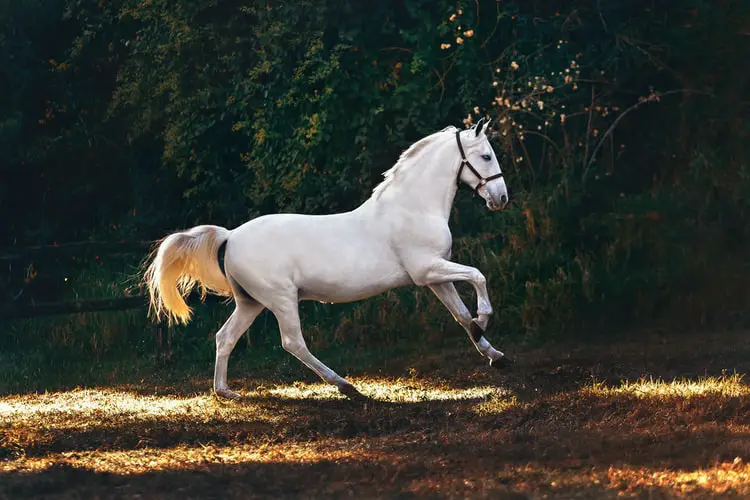Last Updated on September 7, 2020 by Allison Price
A horse’s neigh is usually created when air passes through the vocal cords. These may change according to the position of the throat muscles and tongue. Also, it varies during the opening of the mouth and position of the lips.
Why do horses neigh?
Anyone who has spent time around real horses know that they don’t make that much noise. And when they do, it’s for specific reasons. Vocalization in equines is always a social behavior. Neighing in general is increasing pitch and increasing frequency of the sounds. While making up the ‘call’ is the sound of separation anxiety or social isolation.
Neighing usually means they want to attract the attention of other horses or of people. This also how horses greet their affiliates, and are also seen with tension. It is also usually with separation anxiety when trying to regain contact like ‘I am here, where are you?’”
A horse separated from its herd or relocated to a new place where it does not know any equine fellows may neigh. If there are other horses in earshot, they may also respond with a whinny chorus. Indeed, neighing can signify everything from courtship desires to a simple “here I am.”
What to Do If A Horse Keeps Neighing?

Even though neighing is then indeed an endearing tone, too much of it can be quite confusing. Having no idea why your horse is neighing, or “whinnying,” all day, you can’t do much to help the poor thing, either. This is why you need to understand the meaning behind the horse’s neigh at first.
Here are some scenarios why horses neigh:
- The horse will start neighing if they are calling for their companion. If you have any idea where your horse’s pal in question is, you may be able to point him into the right direction.
- Neighing can also be a sign of missing someone. This is usually resolved by allowing your horse to meet their favorite buddy.
- Horses may be responding to the neighing sound they hear from their herd. As most you know, in a herd there is a horse that is usually a superior, thus they have an attitude of being dominant. They want the herd to be then controlled by them.
- Some horses neigh when they’re feeling frustrated, nervous, and even lonely. If somehow they find comfort and are feeling happy, they may emit rather piercing neighs.
- Let your horse neigh until it calms down. They usually contain their emotions with their neighs.
- Stallion expresses their desire in mating with gentle, and prolonged neighing sounds.
- Let your stallion neigh as much as he wants. If he keeps on neighing then he is serious about getting the mare’s attention. You should consider the coming of mating period in horses. Neighing non-stop can be a sign of hunger. If it is the time to feed your horse or give him a treat, he can get a little restless and will start neighing to remind you.
- Do not forget to feed your horse. Draw a schedule for a feeding routine. Be responsible.
If you hear a horse whining when in the company of other animals, he is on alert. This may be because he sees something unusual, and is alerting his pals of the possible danger. Look out for their defensive stance as it may follow an attack. Check beyond the herds to see what is going on. Be careful not to get caught up in a horse fight as it can get bloody sometimes.
What it Means When a Horse Neighs at Night Nonstop
Horses are generally very quiet animals. But, if they start neighing nonstop in the middle of the night it means there’s something wrong. You have to go out, and check the stalls. Please carry a baseball bat with you, just in case.
Other Horse Language

The thing about horses is that they are loyal, intelligent, and communicative. They like to let their owners or trainers know what it is they are going through or feeling. Since they can’t talk, they voice out what is bugging them through a variety of horse sounds.
Nicker
A nicker is a soft, low sound that mares use when their foal arrives. It is also the greeting received by many as they approach their horse, who may expect a treat. It is an invitation to come closer. It is also part of courtship with stallions and a greeting to members of a herd when coming together. Although it suggests relaxed interaction, stressed and excitement are usually the high-pitched squeal.
Squeal
A squeal can be usually associated with defensive and aggressive behavior. The squeal can also mean any extreme and sudden arousal. It’s usually seen when mares are then approached and when new horses meet. Squeals can be also heard from mares in season. This indicates their receptiveness towards the stallion and excitement. A mare not in season will try to put off an overeager stallion with a squeal and a kick.
Snort
Horses that snort are usually happier. But, it can be also associated with alarm or a fear response and alerts the herd of possible danger. This is usually followed by a confident individual investigating the area. As they go nearer, horses will blow loudly through their nostrils creating a snort
Grunts and Groans.
Grunts and groans is usually associated with pain or exertion. This is especially in serious combat and olfactory investigation. It can be also referred as contentment.
How can you tell the difference?
If a horse grunts or groans when training, it could mean they might have injured themselves. You would need to give them medical help. If a horse grunts while on its way back to the stable after a long day of work, they want a massage or bath. They want something that would help them relax.
Scream
A scream is one of the most distressing or terrifying noises a horse can produce. It is a clear sign of either extreme pain or extreme anger. Most domesticated horses do not scream. But if they do, they are in major discomfort.


